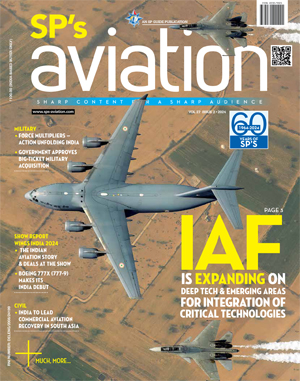INDIAN ARMED FORCES CHIEFS ON
OUR RELENTLESS AND FOCUSED PUBLISHING EFFORTS

SP Guide Publications puts forth a well compiled articulation of issues, pursuits and accomplishments of the Indian Army, over the years

I am confident that SP Guide Publications would continue to inform, inspire and influence.

My compliments to SP Guide Publications for informative and credible reportage on contemporary aerospace issues over the past six decades.
SCO Cyber Security Seminar
This was the second time India was hosting such a cyber security seminar and first after it took over the Chair of SCO Regional Anti-Terrorism Structure (RATS) Council
 |
The Author is Former Director General of Information Systems and A Special Forces Veteran, Indian Army |

India hosted a two-day Cyber Security Seminar for member countries of the Shanghai Cooperation Organisation (SCO) on December 7-8, 2021. The Event was organised under the framework of SCO’s Regional Anti-Terrorism Structure (RATS). The Executive Committee of RATS, headquartered in Tashkent, Uzbekistan, is a permanent organ of the SCO which serves to promote cooperation of member states against the three evils of terrorism, separatism and extremism.
India and Pakistan joined the SCO as full member-states at the SCO Summit in Astana (8-9 June 2017), Kazakhstan. Before the addition of these two South Asian nations, the SCO consisted of China, Russia, Kazakhstan, Uzbekistan, Tajikistan, and Kyrgyzstan. By 2019, the eight-member SCO then also has four observer-states, including Afghanistan, and six dialogue-partners, including Sri Lanka. In total and together, they constitute much of the Asian geography with a population of over three billion people.
The SCO member states are to continue to build practical cooperation and consolidate efforts in the field of international information security based on the relevant cooperation plan for 2022-2023
The Dushanbe Declaration signed on the twentieth anniversary of the founding of SCO at Dushanbe, capital of Tajikistan on September 17, 2021, appreciated the positive role of SCO in promoting and deepening good-neighbourly relations among member States and strengthening security and stability in the region.
The Dushanbe Declaration also noted the achievements of SCO, to include -
- Strictly following the principles and provisions of the SCO Charter;
- Treaty on Long-term Good-Neighbourliness, Friendship and Cooperation of SCO Member States;
- SCO Development Strategy until 2025;
- Shanghai Convention on Combating Terrorism, Separatism and Extremism;
- Multilateral Trade and Economic Cooperation Programme;
- International treaties and normative legal documents of the Organisation based on the "Shanghai spirit".
As part of the above declaration, the member states reaffirmed the special role of the SCO RATS in the joint fight against terrorism, separatism and extremism in order to ensure regional security and building the capacity of competent authorities in these areas of cooperation. Priority was to be given to the implementation of the 2022-2024 Programme of Cooperation of SCO member states in Countering Terrorism, Separatism and Extremism. The SCO member states are to continue to build practical cooperation and consolidate efforts in the field of international information security based on the relevant cooperation plan for 2022-2023 and other documents adopted by the Organisation.
When India hosted a NSA-level meet on Afghanistan at New Delhi in November 2021, the Pakistani NSA did not attend fearing that Pakistan’s support to Taliban and its role in Taliban takeover of Afghanistan may come up for discussion
In March 2021, India and Pakistan held talks on sharing of waters under the Indus Water Treaty, which is actually heavily lopsided in Pakistan’s favour with about 80 per cent water going to Pakistan against international norms considering the size of the river basins in India. In June 2021 during the meeting of National Security Advisors (NSAs), Ajit Doval, India’s NSA underlined the need to take action against Proscribed terrorists and also called for an action plan to tackle Pakistan-based terrorist organisations like Lashkar-e-Taiba (LeT) and Jaish-i-Mohammed (JeM).
However, when India hosted a NSA-level meet on Afghanistan at New Delhi in November 2021, the Pakistani NSA did not attend fearing that Pakistan’s support to Taliban and its role in Taliban takeover of Afghanistan may come up for discussion, as also Pakistan-based terrorists like the LeT and JeM and their use of the internet.
For the SCO Cyber Security Seminar under the aegis of RATS at New Delhi on December 7-8; China, Kazakhstan. Kyrgyzstan, Russia, Tajikistan, Uzbekistan, and Pakistan had confirmed participation. The Pakistani delegation arrived in India on December 6. The National Security Council Secretariat (NSCS) in association with the Data Security Council of India (DSCI) organised the seminar. India assumed the Chairmanship of the RATS SCO Council on October 28, 2021 for a period of one year. This was the second time India was hosting such a cyber security seminar and first after it took over the Chair of SCO RATS Council.
A government statement issued on conclusion of the above seminar read -- The programme focused on the changing nature of on-line crimes and criminal behaviour in order to understand the threats, trends, issues, responses and ethical questions associated with, mainly terrorists using technology.
- The programme examined issues related to the cyber realm from an interdisciplinary and multi-dimensional perspective, offering a unique look at a range of challenges.
- Technical challenges during digital forensics examination were discussed in detail with case scenarios.
- The seminar provided hands on practical experience to the participants to enhance capabilities against terrorism.
- An exhibition by various Indian digital forensics tools and solution providers was also organised to showcase global products and tools.
The foundational purpose of SCO as the largest inter-governmental organisation in the world is to strengthen mutual trust and promote good neighbourly relations among its member-states. This is to be achieved through gradual but consistent efforts by the SCO member-states to engage in multifaceted cooperation to advance their collective, common interest in the sustainable human and protective security of the SCO space. Concurrently, the SCO also seeks to establish a more democratic and rational world order.
When India and Pakistan joined the SCO as full member states in June 2017, it was hoped that it would bridge the gap between the two nations. But it is more than evident that Pakistan has no designs to ease its proxy war on India which also is supported by China.
News reports of August 2021 indicated that a Pakistan-originated malware that previously targeted the power sector and government organisations in India and Afghanistan, has developed the ability to adopt new cyber-attack capabilities. Evidence showed that the attackers used a forged United Nations meeting platform to lure the government targets. Researchers have named this new programme “ReverseRat 2.0” after its previous known version.
Pakistan would be using events like a cyber security seminar to gauge how the regional and global responses against cyber threats are shaping up and how Pakistan can refine its cyber attacks further by exploiting the cyberspace
Both Pakistan’s ISI and Pakistan-based terrorist organisations continue to flood the internet and social media with fake news to incite and promote terrorism. Recall that Zulfiqar Ali Bhutto as President of Pakistan had said, “We(Pakistan) will eat grass, even go hungry, but we will get one of our own atom bombs.” Today the slogan in Pakistan appears to be, “We will continue terrorism with the hope to balkanize India, even if we ourselves split in the process.”
Pakistan would be using events like a cyber security seminar to gauge how the regional and global responses against cyber threats are shaping up and how Pakistan can refine its cyber attacks further by exploiting the cyberspace. When responsible and rational behaviour from Islamabad can be expected is anybody’s guess given the support it is getting from China in promoting terrorism against India.





